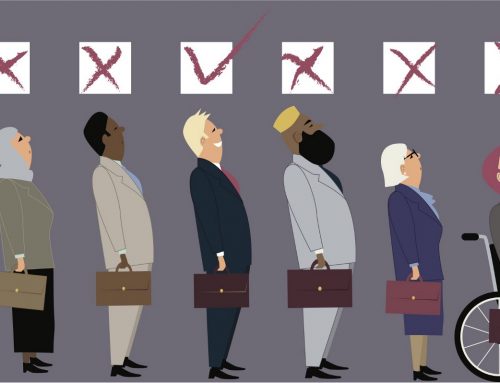Ok. So a couple weeks ago I did something. I talked openly about MY experience with sexism in tech through my blog post “A Woman in Tech’s Open Letter to My ‘Sexist’ Colleagues”. I did it in the most compassionate and conscious way I could through sharing my personal forgiveness exercise for those who I felt had belittled me based on my gender. This experience was true for me. I didn’t share the transcripts of any exact experiences or quantify my experience in any way except for its toll on my own emotions.
Why did I do it? First, I wanted to share my experience to let women who were experiencing difficulties know that they were not alone. Second, I was curious to see what else happened. When women in tech get together privately, the conversation often turns to experiences like the ones I shared. However, it is still scary to discuss this topic openly at work for fear of being labeled as “Difficult” or “Complainer”. Sharing it openly was sure to derive some interesting takeaways. So what did I find out?
THE TRUTH: There is no consensus reality on sexism in tech. Only interpretations of individual experiences and some obvious trends
Over 1,400 people have read the post so far and 2000 have viewed it. I left out likes on my personal Facebook page because a large portion of those people do not work in technology, and well, my mom and dad liked it so there is some bias. (Thanks mom and dad!)
Women: Approximately 45 women told me they identified with my experience in some way, either by thanking me, asking how they can get involved in solving this problem, and/or telling me they had experienced similar issues. Two women told me that they heard about it a lot from their female colleagues but they didn’t see it personally.
Men: Approximately 25 men exhibited compassion and support— either by reposting my blog, commenting on it positively, and sending me private messages. Approximately 15 men did not agree with the post in some way— either through telling me sexism in tech did not exist, that my experience wasn’t sexism but other factors in the environments I worked in, that it was a solved problem, or that it was a problem being solved that didn’t need my interference. None of these 15 men expressed curiosity about my exact experience. In addition to these responses, one man who was older than his colleagues told me he experienced unconscious bias himself at work and that this issue did not just apply to women. (personal viewpoint: I agree with him!) One colleague came to me concerned he had been sexist towards me at some point. In my experience he had not.
I tried to get more statistics by running two Facebook ads with the post targeting people with an interest in enterprise software and information technology. My takeaway is that Facebook is not good at identifying real tech people based on these interests as the people I reached did not have careers in tech. (Goodbye $40! Thanks for the lesson!)
So, the TRUTH is that these 45 women and 25 men have a different perspective on sexism in tech than the 15 men and 2 women who don’t see it. Within these groups there are many different perspectives as well. Over 1300 readers of the post were silent and so we don’t know what they think.
So based on this TRUTH — what can I infer?
The word and/or topic of sexism triggers some people
Many of the men who didn’t believe sexism existed expressed anger or discomfort with my statement but did not make any attempts to understand my point of view. When an individual attempts to redefine someone’s experience without a full understanding of it, they do it because they are triggered. People become triggered because they are afraid of a negative consequence and/or experience. To put ourselves in the men who are triggered by this subject’s shoes, one reasonable assumption is that they are afraid of their sex being further labeled as oppressors. Having the label of oppressor is not fun and not comfortable, of course they would negate the validity of my experience. This does not mean they are good or bad. They are simply triggered and unconsciously acting to remove the trigger, which in this case was my blog post that had the word “Sexism” prominently displayed in it. So what can we do about it?
Eliminating the trigger is essential to resolve the issue in a conscious way
When people are triggered, they can’t listen. Let’s take the power out of the word sexism. When most people think about sexism, they think about HR, lawsuits, lawyers and angry women (I have validated this.) That is an interpretation of the word based on fear of negative experience. Let’s look at the definition of the actual word.
The simple definition of sexism from Merriam-Webster is unfair treatment of people because of their sex; especially the unfair treatment of women. It also has a full definition.
- prejudice or discrimination based on sex; especially discrimination of women
- behavior, conditions or attitudes that foster stereotypes of social roles based on sex
Let’s take a look at a single experience many women in tech have. Some men assume we are not technical at tradeshows. This is not up for debate. It happens.
Exploring this — when a man walks up to me at a tradeshow booth and tells me to get someone technical he is prejudging that I am not technical. Is it because of my sex? Well I think so! I never see this happen to men. But maybe it does. I really don’t know. Does it mean he is an evil sexist man who woke up in the morning with the intent of making me wish I had my BSEE and other technical accomplishments tattooed on my forehead? No. Of course not. He is busy, trying to get information, and there are more non-technical women at tradeshow booths than men so he did what he thought was most efficient. It certainly would have been a more pleasant experience for me if he gave me the opportunity to identify whether I was technical or not. More importantly, he prejudged me, so his behavior fits the long definition of sexism. What would happen if I told him I would prefer not to be prejudged on my technical aptitude? It would be interesting to find out! I’m certainly not going to call my HR department and hire a lawyer to sue him. This was a single moment in time where he was reacting to the chaos of the show floor — not a full expression of his beliefs. However, he prejudged me I can mostly assume based on my sex and many women report this type of experience. It was probably a sexist moment. But I do not know if he is a sexist person in general. So let’s start looking at these incidents as potentially sexist moments we would like to reduce the frequency of. That feels a lot better to most people than “FIGHT SEXISM!”. Doesn’t it? Nothing to trigger us there.
Now that the trigger is removed, let’s start to solve it by being really curious
Major efforts are underway to get more girls into STEM. However, according to Harvard Business Review, over 50% of women leave their careers in tech based on perceived hostile work environments. Both issues need to be addressed.
How can curiosity help us? By consciously trying to understand each other’s experiences, we are increasing our understanding of why many women feel like they experience sexism in tech, many men experience it happening to women, and there are others who don’t.
Let’s take an uncurious conversation I had with a male colleague about this topic.
Colleague: “I don’t think sexism in tech exists.”
Me: “It does. Its not just me.”
Colleague: “Oh”
Had I been aware that I was triggered (I thought he was trying to change my view but he really wasn’t), I could have asked him why he believed it. I might have learned something powerful. Instead I shut him down and I won’t know until I approach him again with curiosity.
Now, let’s take a curious conversation with a female colleague.
Colleague: “I hear from so many other women that they feel sexism but I just don’t experience it myself. I don’t know why.”
Me: “That’s really interesting. What do you see that’s different about you? Most of these feelings come from our childhoods. What was different about yours?”
Colleague: “I had many men in my life who believed I was powerful and I could do anything.”
Me: “Yeah. I had a little of that but definitely not as much. How interesting!”
I learned that she had a different belief in her ability to be accepted as powerful by men than I did. This is a very important clue.
We cannot change each other’s experiences. We can only learn from them.
So, with all-out curiosity and a promise of non-judgement, what are your experiences and beliefs about sexism in tech? I’d love to hear them and I am very very curious!


Leave A Comment